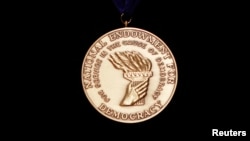Russian prosecutors Tuesday designated the National Endowment for Democracy (NED), a Washington-based non-profit group funded by the U.S. Congress, as "undesirable" — making it the first foreign NGO to be banned in Russia under a controversial new law.
In a statement posted on its website, the Prosecutor General's office said an investigation has determined that NED presents a threat to the constitutional order of Russia, its defense capabilities and state security. The statement alleges that NED, by using Russian businesses and non-commercial organizations under its control, participated in activities to delegitimize the outcome of elections, influence government decisions and discredit service in Russia's armed forces.
Responding to being named an "undesirable" organization by the Russian government, the NED said Tuesday that the law on undesirable organizations is “the latest in a series of highly restrictive laws that limit the freedom of Russian citizens."
“This law, as well as its predecessors, contravenes Russia’s own constitution as well as numerous international laws and treaties," the NED said in a statement. "The true intent of these laws is to intimidate and isolate Russian citizens.”
The NED said it “remains committed to supporting human rights and fundamental freedoms throughout the world.”
Founded in 1983, the NED makes more than 1,000 grants per year to support the projects of NGOs working for democratic goals in more than 90 countries. It has funded a number of Russian human rights and civil society groups, including the Moscow Helsinki Group, Russia's oldest human rights group active today.
In May, President Vladimir Putin signed a law giving prosecutors the right to declare as "undesirable" foreign and international non-governmental organizations whose activities are deemed a threat to Russia's constitutional system, "defense capability or the security of the state."
Earlier this month, the Federation Council, the upper house of Russia's parliament, formally asked Russia's foreign and justice ministries and Prosecutor General's Office to look into the activities of 12 NGOs — a "patriotic stop list" of organizations it said were suspect, including the NED — after which another American group on the list, the MacArthur Foundation, announced it was closing its Moscow office. In a statement, the MacArthur foundation cited conditions that make it "all but impossible to operate effectively" in Russia. The same statement also expressed concern for the fallout that Russian partner NGOs might face for their association with MacArthur.
American organizations on the list included Freedom House, the Charles Stewart Mott Foundation, billionaire philanthropist George Soros' Open Society Foundation and the MacArthur Foundation.
While tensions between Russia and the West have run high over the ongoing crisis in Ukraine, suspicion of NGOs and civil society is not a new theme in Russia's Putin era.
The Kremlin has long accused the United States and Europe of using NGOs to fund street uprisings in former Soviet republics, including so-called "color revolutions" that toppled pro-Kremlin governments in Ukraine, Georgia, Moldova and Kyrgyzstan.
When protesters swarmed Moscow's streets in the fall of 2011 amid evidence of election fraud aimed at keeping Vladimir Putin's ruling United Russia party in power, authorities blamed the U.S.- and Western-financed Russian NGOs for instigating the insurrection.
The Kremlin's response came with Vladimir Putin's re-election to the Russian presidency in May of 2012.
Under a separate law introduced at the time, Russia's own NGOs were required to register as "foreign agents" for receiving funding from abroad and engaging in what authorities loosely term "political activities."
Leading civil society activists have widely rejected the term "foreign agents" as akin to being labeled traitors and have attempted, unsuccessfully, to challenge the label in Russia's courts.
On Tuesday, the Committee to Prevent Torture, a Russian human rights organization based in Nizhny Novgorod, announced it had decided to close its doors after losing a lengthy court battle over the "foreign agents" tag.
In an interview with VOA, the Committee to Prevent Torture's director, Igor Kalyapin, said the campaign against his and other NGOs has been driven by "anti-Western hysteria."
Kalyapin accused local bureaucrats of applying the "foreign agents" law as widely as possible in an effort to please the Kremlin.
"I know the history of my country and I know that when these types of repressive measures appear, there's competition," said Kalyapin. "And now the competition is to see who can find the most foreign agents. ... It's a game no bureaucrat wants to lose."
Asked Tuesday about the move against the NED, Sergei Nikitin, Moscow office director for London-based human rights group Amnesty International, said: "It's not important whether we are talking about the NED or about some other organization. We are witnesses to another dark chapter in the history of our country.
"It is about an unprecedented attack on non-governmental organizations," he added. "All of these limitations that we see — one law after another, foreign agents, undesirables — they are an integral part of a growing wave of repression aimed at the suppression of freedom of speech, the omission of debate, and the stifling of freedom of expression."
The U.S. embassy in Moscow also is expressing concern about the wider implications of the undesirables law for Russian civil society.
"We are still concerned about growing restrictions being imposed on the work of independent media, on the functioning of civil society, and on members of minorities and opposition forces," U.S. embassy spokesperson Will Stevens wrote in a statement to the Interfax news agency.
